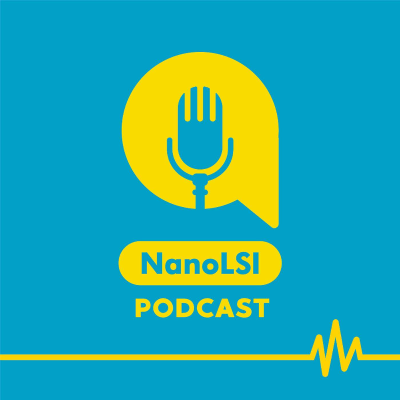
Kanazawa University NanoLSI Podcast
engelsk
Videnskab & teknologi
Begrænset tilbud
2 måneder kun 19 kr.
Derefter 99 kr. / månedOpsig når som helst.
- 20 lydbogstimer pr. måned
- Podcasts kun på Podimo
- Gratis podcasts
Læs mere Kanazawa University NanoLSI Podcast
The Kanazawa University NanoLSI Podcast offers updates of the latest news and research at the WPI-NanoLSI Kanazawa University. The Nano Life Science Institute (NanoLSI) at Kanazawa University was established in 2017 as part of the World Premier International (WPI) Research Center Initiative of the Ministry of Education, Culture, Sports, Science and Technology (MEXT). Researchers at the NanoLSI are combining their cutting-edge expertise in scanning probe microscopy to establish ‘nano-endoscopic techniques’ to directly image, analyze, and manipulate biomolecules for insights into mechanisms governing life phenomena such as diseases. Further information WPI-NanoLSI Kanazawa University websitehttps://nanolsi.kanazawa-u.ac.jp/en/
Alle episoder
53 episoderHigh speed atomic force microscopy studies provide insights into influenza A viral replication
D. Carlero et al, ACS Nano 2024, 18, 30, 19518–19527 Researchers from Kanazawa University's NanoLSI, IMDEA Nanoscience, and CNB-CSIC studied influenza A replication using high-speed atomic force microscopy. They observed that recombinant ribonucleoprotein complexes (rRNPs) can undergo multiple transcription cycles, with RNA structure stability influencing synthesis rates. Their findings offer new insights into viral replication mechanisms and RNA synthesis regulation, opening doors for further research on gene expression control. NanoLSI Podcast website [https://nanolsi.kanazawa-u.ac.jp/en/announcements/nanolsipodcast/]
Atomic force microscopy in 3D
M.S. Alam et al, Small Methods 2024, 2400287 Atomic force microscopy (AFM) was initially developed to visualize surfaces at nanoscale resolution. Researchers at WPI NanoLSI, Kanazawa University, have now extended AFM for 3D imaging, particularly for flexible nanostructures like carbon nanotubes. They demonstrated that dynamic mode AFM, which uses a vibrating tip, causes less friction and damage than static mode, making it ideal for imaging delicate biological systems like cells, organelles, and vesicles . NanoLSI Podcast website [https://nanolsi.kanazawa-u.ac.jp/en/announcements/nanolsipodcast/]
Sensing a biomarker
Madhu Biyani and colleagues at NanoLSI, Kanazawa University, have developed a sensitive and selective electrochemical biosensor for detecting the cancer biomarker ADAR1, using new aptamers. This cost-effective tool enables rapid ADAR1 detection in diluted samples, promising improved cancer prognosis and monitoring. NanoLSI Podcast website [https://nanolsi.kanazawa-u.ac.jp/en/announcements/nanolsipodcast/]
Exploring hydrogen peroxide eustress effects on cancer cells using microscopy
Yanjun Zhang, Yuri Korchev, and colleagues used hopping probe scanning ion conductance microscopy to study hydrogen peroxide eustress on colorectal cancer cells, revealing varying cell stiffness and gradients. Their findings could lead to new cancer and inflammatory disease therapies. NanoLSI Podcast website [https://nanolsi.kanazawa-u.ac.jp/en/announcements/nanolsipodcast/]
Biochemical tails tell a story
Mikihiro Shibata and collaborators used high-speed atomic force microscopy to study nucleosome dynamics. They found that nucleosomes without histone tails, particularly H2B and H3, showed increased sliding and DNA unwrapping. These findings highlight the importance of histone tails in chromatin stability and structure. NanoLSI Podcast website [https://nanolsi.kanazawa-u.ac.jp/en/announcements/nanolsipodcast/]
Vælg dit abonnement
Begrænset tilbud
Premium
20 timers lydbøger
Podcasts kun på Podimo
Gratis podcasts
Opsig når som helst
2 måneder kun 19 kr.
Derefter 99 kr. / måned
Premium Plus
100 timers lydbøger
Podcasts kun på Podimo
Gratis podcasts
Opsig når som helst
Prøv gratis i 7 dage
Derefter 129 kr. / måned
2 måneder kun 19 kr. Derefter 99 kr. / måned. Opsig når som helst.















































